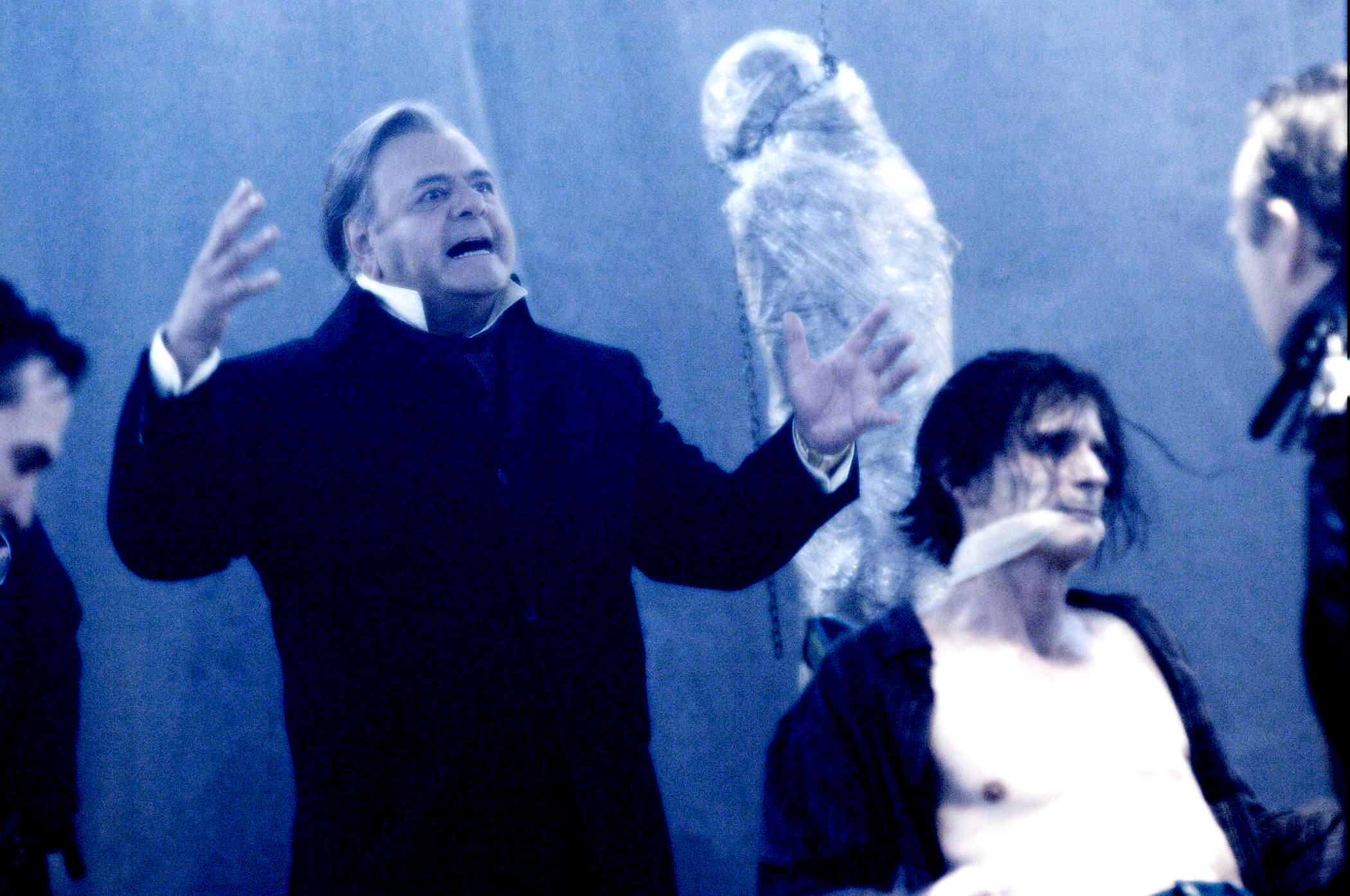
Watching Repo! The Genetic Opera (2008) put into clear focus for me exactly why opera is never really going to be cinematic, albeit I enjoy quite a few opera movies. Like all adaptations, part of the problem is about space, but opera has a special relationship with time that cinema does not share.
Hitchcock limned the essential nature of theater on film, the compression of all events into a space which should be preserved if the filmmaker is to take any power from the play being adapted, rather than dissipating that compression by "opening the play up." The point of Dial M For Murder or Wait Until Dark is that the heroine, and by extension, the viewer, is trapped in a room with a murderer. If you can open the door and run out to the street, the peril is seriously diminished, if not eliminated.
And indeed, many plays are limited or telescoped in time. Alan Ayckbourn has even written three plays which take place at the same time, in parallel, in three adjacent locales. (They have even been produced in such a way as to prove that they perfectly dovetail -- an exit in one play corresponds with an entrance in another, and so forth). But the addition of music -- and nearly constant music -- gives opera a peculiar relationship with time.
First of all, opera abandons the pretense of simulating life in any way. In an instant, we recognize that we are in a rarefied world of artifice -- that everything present is standing in for something else, that nothing has been brought here from the real world. At once, we are in trouble with the cinema aesthetic. Still, fantasy has been made to work on film, especially in the Rings films and the Harry Potter series. But music has specific demands on time itself. It requires a specifed time to unfold, which may or may not correspond with the dramatic value of that moment or the words being sung to that music. In short, opera, and especially operatic dialogue, takes a relatively long time to unfold, and the adapter must either weave a cinematic design through that preset duration, or must simply "fill" the time. And cinema which is filling time is frittering its most hard-won and precious resource.
Rock opera compounds the problem. Whereas in classical opera, the music is filled with harmonic and contrapuntal complexities to engage the ear when the eye is not being refreshed, typically in rock or any music with its roots in the blues, each 4-bar phrase has only 2 or 2-1/2 bars worth of melody. Think of Bessie Smith singing a phrase and Louis Armstrong echoing and embroidering her melody in the interval before her next line. Rock usually dispenses with the embroidery and just "holds still" for 1-1/2 to 2 bars. Again, this is antithetical to film. The usual solution on film is to decorate those moments with theater-style staging: characters pace around, gesticulate and generally thrash around until the next line comes along. Thankfully, Repo! eschews the kind of cheap doggerel in the dialogue sequences favored by Jesus Christ Superstar and other dismal rock operas; the dialogue is sharper and able to move more swiftly than usual. But it is telling that even with this higher level of skill and attention to theatrical detail, we still are not convinced we're seeing a movie. It seems to be a movie of a performance, rather than an aesthetic object complete in and of itself.
There is much to like in Repo!, especially the singing of Anthony Head (best known for Buffy on television), the quavering but resilient tones of the aging Paul Sorvino, a spacey performance by Sarah Brightman and the surprising aptitude of Paris Hilton, whose singing and characterization are surprisingly professional. The notion of a cartel who finances organ transplants and reserves the right to re-possess on defaulted organs is a promising one, although we don't see any reason for those repossesions except cruelty or perversity. (That is, the story would make more sense if there were specific recipients demanding specific organs, and the air of moral ambiguity would be increased of those recipients were actually worthy and sympathetic.) The whole affair has a gratuitously goth-emo element which cries out for contextualization.
But no matter how much more coherent or well-structured the story might be. Even with good lyrics and energetic music, Repo! may do some good deeds aesthetically, but unlike Pinocchio, it will never become a real movie.





Have you seen "Repo Men" with Jude Law? Same plot done in a more palatable way.
ReplyDeleteNo, but I've seen the sketch in "Monty Python's Meaning of Life," which was pretty disgusting.
ReplyDelete